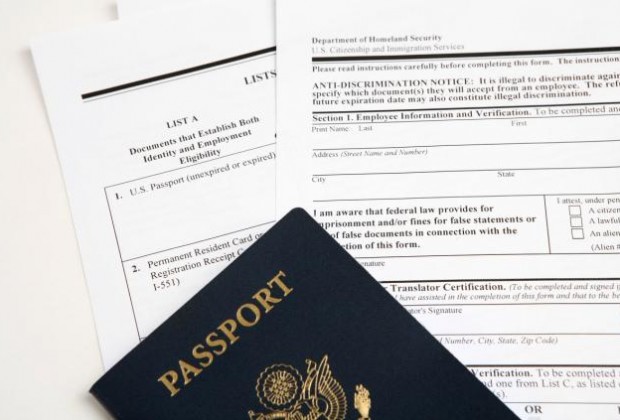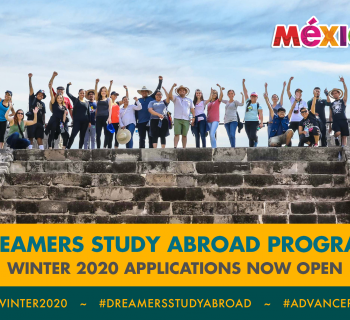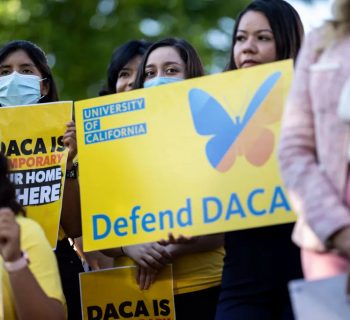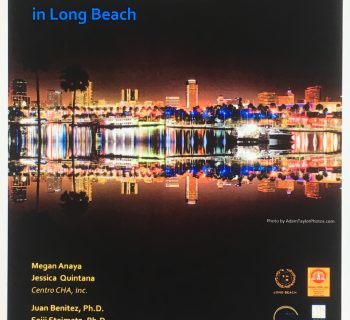By Mark Silverman, and Alison Kamhi
Immigrant Legal Resource Center, August 1, 2015
Introduction: A person with DACA may apply for and be granted permission to travel outside the U.S. temporarily from DHS (the Department of Homeland Security) for humanitarian, educational, or employment purposes. This is called advance parole.[1]
One of the big advantages of having traveled and returned to the U.S. with DHS’ permission is that many DACA recipients will be able to apply for their green card in the U.S. after they return. This is because a person is often allowed to get a green card in the U.S. (instead of having to get it from the U.S consulate in his or her home country) if he or she has lawfully entered the U.S. or been paroled in. Advance parole counts as being “paroled” in – and allows people who have gotten advance parole to then get green cards through immediate relative petitions rather than having to go to a U.S. consulate abroad. This will immediately benefit persons with DACA who are spouses of U.S. citizens, and in the future those who are parents of U.S. citizens.
Often a person who has been in the U.S. unlawfully triggers unlawful presence bars (such as as the “ten year bar”) once he or she leaves. These unlawful presence bars can prevent the person from getting a green card unless he or she is eligible for a waiver. Another benefit of advance parole is that it does not trigger the unlawful presence bars. Nevertheless, persons should consult with an attorney or qualified legal worker because there are some risks of traveling with advance parole, particularly for people who have prior criminal or immigration violations.[2] An advantage of doing this soon is that the next president might end DACA.
Examples: Carlos Casado, then 22 years old, and Maria Madre, then 30 years old, applied for and were granted DACA in 2013 and their DACA was renewed in 2015. Neither are able to adjust their status to become permanent residents in the U.S. because both entered the U.S. without permission as children with their parents and are not otherwise able to get their green cards here. They have been here ever since and never had contact with DHS until they applied for DACA.
CARLOS CASADO is a Mexican citizen and is married to a U.S. citizen, Cindy.
How Carlos would obtain his green card through Cindy’s petition AFTER he has returned with advance parole:
- Carlos applies to DHS and is granted advance parole to travel to Mexico. He travels to Mexico and therefore is permitted to return by DHS. (DHS approves most DACA advance parole requests.)
- Cindy, Carlos’ wife, is able to file an immediate relative adjustment of status application for him because his last return to the U.S. was with the permission of DHS even though his initial entry as a child was unlawful.
- Carlos’ trip to Mexico did not result in the “ten year bar” because he traveled with advance parole. Therefore, he does not have to file a waiver with his green card
- Carlos, accompanied by Cindy, has his adjustment interview in the San Francisco DHS office five months later.
- DHS approves the adjustment application at the interview and Carlos is a permanent resident! (The actual “green card” will be mailed to him later.)
- If DHS denies the application, Carlos remains lawfully in the U.S. with DACA status.
How Carlos would obtain his green card through Cindy’s petition if he did not travel with advance parole:
- Cindy files an immediate relative visa petition for Carlos. Carlos will eventually have to travel to Ciudad Juarez in Mexico for his visa appointment at the U.S. consulate because he does not qualify for adjustment of status in the U.S. due to the fact that his last entry into the U.S. as a child was without inspection.
- Once the visa petition is approved, Carlos files a provisional waiver of the ten year unlawful presence bar based on extreme hardship to Cindy. Carlos does face the unlawful presence bar because he has lived in the U.S. unlawfully for more than a year, and the bar will be triggered once he leaves the U.S. to go to his consular appointment.
- If DHS grants the waiver, and an attorney determines that there are no other problems in the case, Carlos (and Cindy) eventually go to the visa appointment in the U.S. Consulate in Mexico.
- If the U.S. consulate approves his application, Carlos becomes a permanent resident once he is admitted back into the U.S.
- If the consulate denies his application, he may not return, and he may be unable to lawfully return for up to ten years because of the ten year bar.
The advantages of adjusting status in the U.S. after returning with advance parole are:
- Carlos will not have to file a provisional waiver application because he is not subject to the ten year bar. DHS is currently denying a good number of these applications. Carlos will also save thousands of dollars in legal fees because it is much more work for an attorney to do a waiver application than to do an advance parole application.
- If Carlos’ adjustment application is denied, he will be able to stay lawfully in the U.S. whereas if he were denied at the U.S. Consulate, he would be stuck in Mexico.
- The adjustment process will take much less time than consular processing.
MARIA MADRE has a citizen son John, born in the U.S. who is 12 years old in 2015.
How Maria would obtain her green card through John’s petition AFTER she has returned with advance parole:
- Once her son John turns 21, he is able to file an immediate relative adjustment of status application for her because her last return to the U.S. with advance parole was with the permission of DHS. Maria’s trip to Mexico did not result in the “ten year bar” because she traveled with advance parole.
DHS approves her permanent residency at the adjustment interview.
- How Maria would obtain her green card through Maria’s petition if she did not travel with advance parole:
Maria would not be able to obtain her green card at the interview at the U.S. consulate in Mexico because of the ten year bar for unlawful presence. There is no waiver for the parent of a U.S. citizen. She would have to stay ten years in Mexico.
Footnotes:
[1] United We Dream’s excellent resource, Life After DACA, has a description of the requirements of advance parole on pages 2 and 3 of:
http://unitedwedream.org/wp-content/uploads/2014/04/Life-After-DACA-101-Webinar-Guide-.pdf.
[2] CLINIC has a very good discussion, written primarily for legal workers, of the possibility of being able to adjust status through these visa petitions upon the person’s return after having traveled with advance parole. There is also a good discussion of the risks. See https://cliniclegal.org/resources/articles-clinic/advance-parole-daca-recipients








